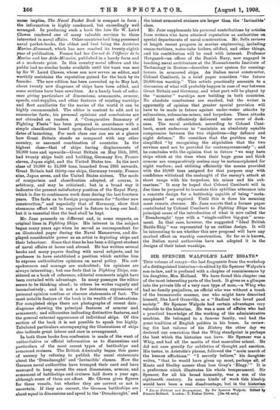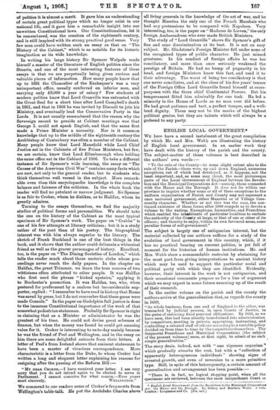SIR SPENCER WALPOLE'S LAST ESSAYS.* THIS volume of essays—the last
fragments from the workshop of a distinguished historian—is edited by Sir Spencer Walpole's son-in-law, and is prefaced with a chapter of reminiscences by his daughter, Mrs. Holland. We have found this chapter one of the most interesting parts of the book. It gives us a glimpse into the private life of a very rare type of man,—a Whig who had no family prejudices, an official who was without a touch of the bureaucratic manner, one who might have described himself, like Lord Granville, as a " Radical who loved good society." Sir Spencer Walpole had certain advantages very valuable to the historian. He was a man of affairs who had a practical knowledge of the working of the administrative machine. He belonged to a famous family, and had the great tradition of English politics in his bones. In review- ing the last volume of his History the other day we declared our conviction that the Whig standpoint is perhaps the best which the historian can have. Sir Spencer was a Whig, and had all the merits of that masculine school. He did not care greatly for subtleties of thought and emotion. His tastes, in Aristotle's phrase, followed the " main march of the human affections." "I secretly believe," his daughter writes, " that he would have given up most, perhaps all, of Keats and Shelley sooner than lose Gray's 'Elegy.' " It is a preference which illustrates his whole temperament. Sir Spencer, for all his broad humanity, was a son of the eighteenth century. In some kinds of work this kinship would have been a real disadvantage, but in the historian • Boa tga Political and Biographical. By Sir Spencer Walpole. Bated by Francis Holland. London: T. Fisher Hnwin. [10s. 6d. net.}
of politics it is almost a merit. It gave him an understanding of certain great political types which no longer exist in our national life, and it gave him a remarkable insight into our unwritten Constitutional laws. Our• Constitutionalism, let it be remembered, was the creation of the eighteenth century, and is still inspired with its strong practical good sense. Very few men could have written such an essay as that on "The History of the Cabinet," which is as notable for its historic imagination as its wide knowledge.
In writing his large history Sir Spencer Walpole made himself a master of the literature of English politics since the Stuarts, and one of the most interesting features of these essays is that we are perpetually being given curious and valuable pieces of information. How many people know that up to 1831 the Chancellor of the Exchequer's was a very unimportant office, usually conferred on inferior men, and carrying only £3,000 a year of salary ? Few students of modern politics know that Lord Granville was entrusted with the Great Seal for a short time after Lord Campbell's death in 1861, and that in 1868 he was invited by Disraeli to join his Ministry, and eventually lead the Conservative Party in the Lords. It is not usually remembered that the reason why the Sovereign ceased to preside at Cabinet meetings was that
George L could not speak English, and that the same first made a Prime Minister a necessity. Nor• is it common
knowledge that up to the middle of the eighteenth century the Archbishop of Canterbury was often a member of the Cabinet.
Many people know that Lord Mansfield while Lord Chief Justice sat in the Cabinets of five Prime Ministers, but few, we are certain, know that Lord Ellenborough when holding the same office sat in the Cabinet of 1806. To take a different instance of Sir• Spencer's wide learning, the essay on " The
Causes of the American Civil War" contains many facts which are new, not only to the general reader, but to students who
think themselves well versed in the subject. More remark- able even than this encyclopaedic knowledge is the complete balance and fairness of the criticism. In the whole book the reader will find no petulant or• narrow judgment. Sir• Spencer is as fair to Croker•, whom he dislikes, as to Halifax, whom he greatly admires.
Turning to the essays themselves, we find the majority studies of political forms and personalities. We should take the one on the history of the Cabinet as the most typical specimen of Sir Spencer's work. The paper• on " Cr•abbe" is one of his few attempts at literary criticism; but it is a study rather of the poet than of his poetry. The biographical interest was with him always superior to the literary. The sketch of Frank Buckland is one of the best things in the book, and it shows that the author could delineate a whimsical friend as well as the graver personages of history. Excellent, too, is the paper on " The Dining Societies of London," which tells the reader much about those esoteric clubs whose pro- ceedings never reach the daily papers. In the chapter• on Halifax, the great Trimmer, we learn the true sources of two witticisms often attributed to other• people. It was Halifax who first used the phrase "kicked upstairs," applying it to Rochester's promotion. It was Halifax, too, who, when pestered for pr•efer•ment by a zealous but inconsiderable sup- porter, replied : " I remember to have read in history that Rome was saved by geese, but I do not remember that these geese were made Consuls." In the paper on Godolphin full justice is done to the immense Constitutional importance of the work of that somewhat pedestrian statesman. Probably Sir Spencer is right in claiming that as a Minister• or administrator he was the greatest of his time. He could not devise great schemes of finance, but when the money was found he could get amazing value for it. Croker is interesting to us to-day mainly because he was the friend of Peel and Wellington, and in the essay on him there are some delightful extracts from their letters. A letter of Peel's from Ireland shows that eminent statesman to have been a master of vivacious correspondence. More
characteristic is a letter from the Duke, to whom Croker had written a long and eloquent letter explaining his reasons for
resigning after the passing of the Reform Bill:—
" Bilt DEAR. Caos.za,—I have received your letter. I am very sorry that you do not intend again to be elected to serve in Parliament. I cannot conceive for what reason.—Ever yours most sincerely, WELLINGTON."
We commend to our readers some of Croker's fragments from Wellington's table-talk. He put the Archduke Charles above
all living generals in the knowledge of the art of war, and be thought Massena the only one of the French Marshals who had any pretensions to be compared with Napoleon. Very interesting, too, is the paper on " Madame de Lieven," the only foreign Ambassadress who ever made British Ministers.
The study of "Lord Granville" shows Sir Spencer's gift of fine and sane discrimination at its best. It is not an easy subject. Mr•. Gladstone's Foreign Minister fell under none of the recognised types of public character. He just missed greatness. In his conduct of foreign affairs he was too conciliatory, and more than once seriously weakened the prestige of Britain. He had no bump of pugnacity in his head, and foreign Ministers knew this fact, and used it to their advantage. The worst of being too conciliatory is that one never conciliates, and at the close of his five years' tenure of the Foreign Office Lord Granville found himself at cross- purposes with the three chief Continental Powers. But his temperament fitted him admirably for one task. He led a minority in the House of Lords as no man ever did before. He had great patience and tact, a perfect temper, and a well- bred dignity. These may not be the marks of the highest political genius, but they are talents which will always be a godsend to any party.



































 Previous page
Previous page